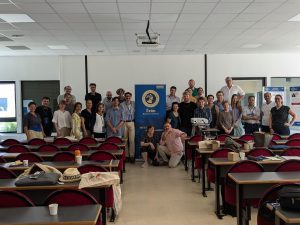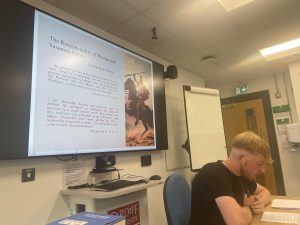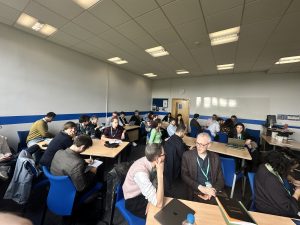April 2024 | BIPS Travel Grant
Rome and Sasanian Iran: Two Conferences and a Workshop
Summary of topic:
In Leeds, Domiziana Rossi and I hosted four dedicated panels which examined the theme of ‘crises’ within the context of Roman and Sasanian relations. In Cardiff, Clare Parry, Ana Garcia-Espinosa, and I hosted a panel strand at the C.C.C which analysed the concept of ‘dynasty and rulership’ within the classical and near eastern context, notably focussing on Near Assyria, Achaemenid Persia, the Seleucids, Parthians (Arsacids), and the Sasanians. Lastly, I participated at the Eran forum in Lille where I discussed my research on Bahram Chobin and gained valuable feedback from senior scholars.
Report:
Over the past four years, Domiziana Rossi (Cardiff University) and I have annually hosted a dedicated panel strand at the International Medieval Congress (University of Leeds) examining various aspects of Roman and Sasanian relations. Each year there are four panels which each focus on a different aspect of the relationship between these two powers. In 2024, the theme was ‘crises’ and I delivered a paper examining Theophylact Simocatta’s depiction of sedition within Roman and Sasanian contexts. It was important to gain feedback on this paper because it formed the foundation of my fifth and final PhD chapter. The paper went well, and the feedback/questions received from those in attendance allowed me to reflect on certain aspects of my argument and thus clarify and nuance them. Overall, the panels were once again a great success with over fifty attendees coming to the panels and interacting with our speakers.
In the following week, I was back in Cardiff where I co-hosted another panel strand alongside delivering a paper. Cardiff University was hosting the Celtic Conference in Classics, and my colleagues Clare Parry and Ana Garcia-Espinosa (Cardiff University) organised a dedicated panel strand which examined classical and near-eastern conceptions of dynasty and rulership. We welcomed both junior and senior scholars with papers consisting of a 45-minute talk followed by 15 minutes of discussion. The panel strand ran over two days with a concluding roundtable on the final day which discussed how we might look to progress our understanding of these themes in our future research. The paper I delivered examined the written correspondence between Emperor Maurice and King Khosrow II during the crisis of Bahram Chobin. Several important themes were highlighted, such as a rulers’ geopolitical duty, the necessity to oppose tyrannical opponents, alongside the developing familial relationship between the two rulers. I was provided with constructive feedback, which again allowed me to refine my arguments ready for writing my fifth thesis chapter.
Only a couple of days after the C.C.C, I travelled to Lille University (France) for the Eran Forum organised by Ekaterina Nechaeva and Khodadad Rezakhani. In the morning, junior scholars developed their understanding of how the academic field of ‘Sasanian Studies’ was evolving through a mixture of lectures and seminars delivered by senior scholars. In the afternoon, junior scholars were able to workshop a piece of research and gain valuable feedback on it from senior colleagues and peers. Consequently, I received feedback on a conference paper delivered in Venice that will be developed into a contribution for an edited volume. The paper focused on Bahram Chobin and analysed how we (modern historians) can assess how treason was understood by contemporaries and their writers It tackled the issue of modern conceptions towards judging treason and identified how we might need to change our perceptions of Bahram Chobin and Khosrow II when discussing ideas of legitimacy and treason. Again, important scholarly networks were established and strengthened at the event with future collaborations also discussed with colleagues. I would like to thank Ekaterina and Khodadad for accepting my paper and affording me this opportunity.
Hosting and participating in these three events, respectively, was an intense couple of weeks. Nonetheless, it provided ample opportunity to test my arguments and therefore nuance them in preparation for completing the PhD thesis, alongside future publication. I would like to thank The British Institute of Persian Studies for their support. Their generous financial assistance allowed me to co-host and attend these important events over the summer, forging and strengthening important and long-lasting networks, alongside gaining significant feedback on my research in the final stages of the PhD.
—
Sean Strong is a PhD student at Cardiff University.


